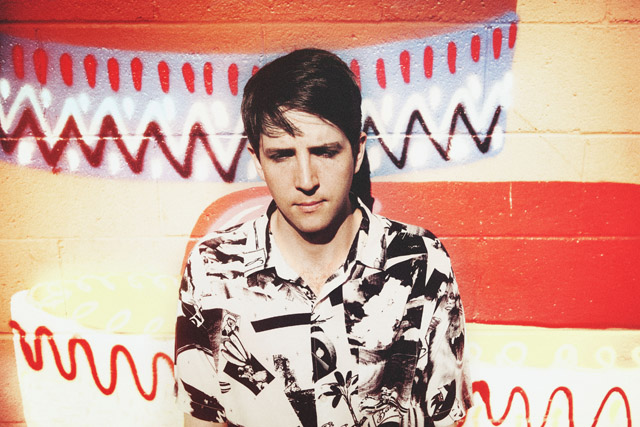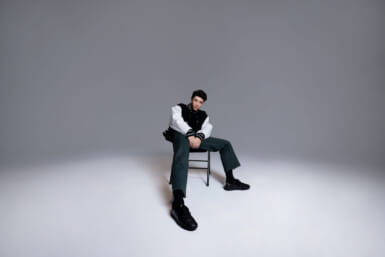Owen Pallett is unfazed by accolades. In the past year, he was nominated for an Oscar, joined an arena tour with indie rock’s biggest band, The Arcade Fire, and drew rave reviews for his latest release, In Conflict. While this may seem like Pallett’s finest hour, he describes it as anything but.
By Kyle Mullin
“This record seems to have a major stumbling block for a lot of people,” Pallett (who will perform at Fuji Rock on July 27) says over the phone of In Conflict’s reception. Many critics have praised the album’s lyrics, which are the most direct of any Pallett release. But others were unimpressed by his newly open and candid verses.
Of the criticism, Pallett says: “There’s a lot of people out there who cannot hear the words that a homosexual Canadian is singing, and think that it has any bearing on their own lives. I’ve read some critics— some who I really respect, with whom I have a rapport—who find it difficult to identify with my words on this record. And a large part of it has to do with my identity and who I am.”
Pallett fully admits that heteronormality isn’t the only factor keeping his album from clicking with some listeners, clarifying that he has plenty of straight fans and friends, and In Conflict simply may not be to some people’s tastes. But he adds that the arts and entertainment world isn’t nearly as progressive as many would like to believe.
“When I look at my fellow indie musicians, the ones who are queer and who sell the most tickets and get the biggest guarantees, they are all closeted, with the exception of Tegan and Sara,” Pallett says, adding that the openly lesbian pair are indie-pop anomalies. For other peers in the queer alt-rock community, Pallett says: “Their sexuality is an open secret that no one talks about. But as soon as it works its way into the work, then it becomes an issue.”
Pallett, who has been openly gay throughout most of his career, has built critical acclaim and a cult following by mixing of synths, classical violin training and baroque pop sensibilities. He says he was discouraged by the heteronormality that tainted some of the response to In Conflict, especially after he had taken such pains to be lyrically open. That more direct approach was prompted, in part, by what Pallett saw as a gaping void in the LGBT community.
“Ultimately, I felt compelled to do this when the It Gets Better Project went down,” he says of the recent series of viral videos that aimed to combat LGBT youth suicide. Pallett says the project was very noble, but it might not have been comforting when he was a teen struggling with depression and an onslaught of homophobia. “These celebs were making videos and talking about how hard their lives were, and how ‘things get better.’ But because it was such a one sided conversation, because it was these upper middle class, typically urban, typically white people looking at the camera and talking about how great their lives now are, I felt that my teenage self would be alienated by this. It would be better if one of these people were to say, ‘Oftentimes all you need is to have a moment to talk to somebody. And here’s my number.’”
The Secret Seven
Pallett admits that such a degree of availability would be unrealistic for those who make such videos, although he points out that his own phone number is plainly listed in the lyrics on In Conflict’s album cover, and he invites those in need to give him a call during the chorus for the album’s midway, plaintively upbeat tune “The Secret Seven,” the title of which refers to the number of digits needed to dial him up.
Pallett says that his latest lyrics may be more effective than other famous gestures to gay youth because his verses showcase struggle, and not just the triumph over it. A reviewer for Pitchfork, one of the many music publications to praise In Conflict, wrote that the album’s lyrics “veer often into excruciatingly personal territory: On ‘The Passions,’ he invites us into his bedroom while someone goes down on him. ‘You hook your pinkies in my jeans/ I’m 28 and you’re nineteen,’ he croons. If Heartland had him tentatively dangling a foot in autobiography, In Conflict finds Pallett taking a running leap off the dock.” The review went on to quote another achingly candid line on the In Conflict cut “I Am Not Afraid,” where Pallett sings: “I’ll never have any children/ I will bear them and confuse them.”
The Passions
I Am Not Afraid
After mustering the will to showcase such raw vulnerability, Pallett was especially disappointed to see that several reviewers couldn’t relate to those lines. It frustrates him because he feels music needs more of that openness, regardless of the audience’s sexuality, or that of the performer.
“There’s a vacuum of information in pop music now, and it’s created by musicians being deliberately inaccessible,” he says, citing Radiohead and his pals in the Arcade Fire as examples, because both bands only grant interviews for cover stories. Pallett adds that artists like Bonnie Prince Billy take that sentiment further, by practically refusing to do any press at all. “It makes people thirsty— they want more Bonnie Prince Billy, they want more Arcade Fire, because they’re feeling like they can’t get enough, because theres’ such a trickle of information. I find that relationship to be unhealthy, rooted in a lack of compassion, and a lack of understanding in the fact that all humans are equal. It’s exciting, it’s romantic, and of course if you put me in a room with Justin Bieber I probably won’t be able to take my eyes off him, because of that celebrity factor. But, for better or worse, it’s something that I try to remove from my artistic practice.”
Pallett adds that he can objectively see the appeal of Arcade Fire’s marketing style, and he admires their efforts to hoist indie rock onto a grander stage—it’s just not the direction he wants to pursue in his own solo career. That stark contrast became all the more apparent as Pallett joined the Montreal alt-rock stars, with whom he played violin for their Grammy winning 2010 album The Suburbs, on their current tour. This allowed him just enough time to play more intimate shows of his own between their stadium gigs.
“The Arcade Fire shows are huge, ironclad and perfect. Then I’d switch to my own shows, where I’ll be playing to a room of 500 people, flying by the skin of my teeth to keep the songs together,” Pallett says, adding that he much prefers his own, ramshackle gigs to the Arcade Fire’s more polished affairs. “My smaller gigs have a nice cooperative feeling, like I’m taking more chances onstage and I’m trying to get the audience on my side. It feels like there’s a little more depth to it than the strict consumer-artist relationship of a stadium show.”
And while Pallett clings to the virtues of a lean career, he can’t help but admit that his outlook has been rattled in 2014. That’s because the year got off to a surreal start when he and the Arcade Fire’s Will Butler, younger brother of frontman Win, received a Best Original Score Academy Award nomination for their work on Spike Jonze’s lauded film Her.
Video: from the Her soundtrack
“The whole Oscar thing kind of threw a wrench in my outlook,” Pallett says with a laugh, before adding: “Here I am thinking that I have it figured out, I’m going to make music and keep things small. Then this Oscar nomination comes through, and people were so positive and congratulatory, people who hadn’t even seen the movie, or didn’t even like the movie or the score. I saw how it was going to have a very large effect on how people digest the music that I make. Which is interesting, it makes me feel like I might have been wrong.”
But Pallett can’t doubt his long held values too much—not for any moral, aesthetic or artistic reasons, or for any fear of selling out. In fact, the exact opposite is the case.
“For all this conversation about having aesthetics and shit, really, most of the decisions I make are strictly financially motivated,” Pallett says with a laugh, adding that his deep economic ethos will factor into everything from the future soundtracks he decides to work on, to the upcoming gigs he books. He adds that it has nothing to do with greed or grandeur, but rather because he has avoided glamour and kept his shows so small for so long. “Staying small is a sound business model. Yeah, you can only make x number of dollars, but you’ll also never lose more than x number of dollars. There’s no danger of losing your shirt, there’s no danger of having to cancel a tour because you can’t sell out that venue. And everybody gets paid—I’m able to pay my drummer just as much as I get paid.”
That egalitarianism doesn’t only apply to Pallett’s touring budget, but also the dynamic he shares with his backing band, which consists of drummer Rob Gordon and bassist Matt Smith. The trio have remained as tightly knit as the baroque synth riffs they unspool onstage, and any attempt to give their frayed edges a glossy, superstar sheen would only make it all unravel.
“On an ego level, keeping things small is also very good,” Pallett says of his ties with Gordon and Smith, before elaborating: “Our working relationship is very strong, and we’re all best friends. If I fight with my boyfriend, I’ll call my drummer and we talk about it. If I’m feeling depressed I might call my bassist. We’re very close, and when we’re travelling it’s a mutually beneficial relationship for all of us. It feels very positive, like we’re all rooting for each other.”
This small scale, pragmatic approach helps Pallett achieve his chief creative goals—accessibility, connection, catharsis and equality. He dreads the thought of feuding with bandmates over corporate contracts via lawyers and execs. He’s not content to have his fans squint at him on a stadium stage from miles away. And, regardless of what some privileged rock critic might write, Pallett longs to not just sing to his audience, but sing with them.
“It’s easier to have the music talk about ‘us’ at smaller shows, rather than just the artist themselves,” Pallett says of the pedestals he hopes to avoid, even as he gains more fame and acclaim. He adds: “When people hear my music I hope they hear it as a document of the human condition, rather than a document of Owen’s condition.”
Owen Pallett will perform at Fuji Rock on July 27. For more information, visit the Fuji Rock Site or Owen Pallett’s official site.









